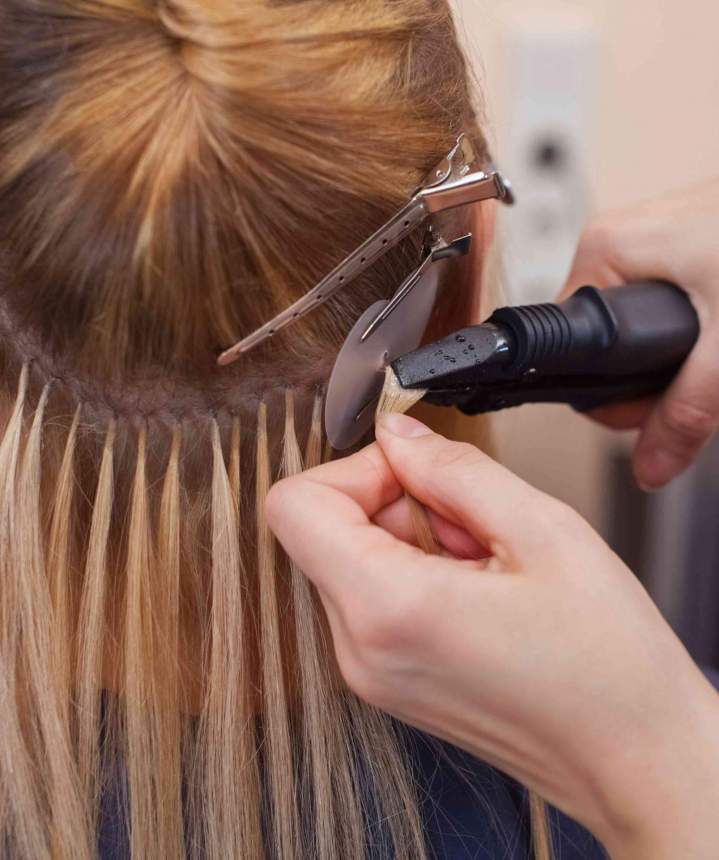Different Types of Hair Extensions Explained
Extensions Zoe Extensions / November 5, 2025

Clip-In Hair Extensions
Overview and Benefits
Clip-in hair extensions are among the most popular options due to their ease of use and versatility. Designed to be worn temporarily, these extensions come with small clips attached to wefts of hair, allowing users to add length and volume within minutes. They are ideal for those seeking a quick transformation for special occasions or a night out.
Installation and Maintenance
Installing clip-in extensions is straightforward—simply section the hair, clip the extensions in place, and blend them with your natural hair. Maintenance involves regular washing and care, similar to natural hair. It’s advisable to remove them before sleeping to prevent tangling and damage.
Suitability
Clip-in extensions are suitable for all hair types, but those with finer hair may need to choose lighter extensions to prevent visible clips. They are perfect for anyone looking to experiment with length or volume without a long-term commitment.
Tape-In Hair Extensions
Overview and Benefits
Tape-in hair extensions consist of wefts of hair that are applied with a special adhesive tape. These extensions offer a more permanent solution compared to clip-ins, lasting anywhere from six to eight weeks with proper care. They provide a natural look and feel, blending seamlessly with the wearer’s hair.
Installation and Maintenance
The installation of tape-in extensions requires professional application, as the process involves sandwiching natural hair between two tape wefts. Maintenance includes regular visits to a stylist for repositioning and ensuring the adhesive remains intact. Users are encouraged to use sulfate-free shampoos to prolong the life of the extensions.
Suitability
Tape-in extensions work best for individuals with medium to thick hair, as they require enough natural hair to hold the adhesive. They are less suited for very fine or thin hair, where the weight of the extensions could lead to damage.
Sew-In (Weave) Hair Extensions
Overview and Benefits
Sew-in extensions, also known as weaves, involve braiding the natural hair into cornrows and sewing the wefts of hair onto the braids with a needle and thread. This method provides a secure hold and is ideal for those seeking a long-term solution, with the potential to last several weeks to months.
Installation and Maintenance
Sew-in extensions require a professional stylist for installation, as the process can be time-consuming and intricate. Maintenance includes regular washing and conditioning, as well as periodic tightening to ensure the weave remains secure. Care must be taken to avoid excessive pulling on the natural hair, which can lead to breakage.
Suitability
These extensions are perfect for individuals with thicker hair types, as the braiding technique may not hold well on finer strands. They offer versatility in styling, including the ability to wear hair up or down.
Fusion (Bonded) Hair Extensions
Overview and Benefits
Fusion extensions involve attaching individual strands of hair to natural hair using a keratin bond. This method creates a natural appearance, allowing for movement and styling flexibility. Fusion extensions can last up to three to four months with appropriate care.
Installation and Maintenance
Professional installation is essential, as this method requires a heat tool to bond the keratin to the natural hair. Maintenance involves careful handling to avoid loosening the bonds and regular visits to a stylist for upkeep. Users should avoid products that contain alcohol, as they can weaken the bonds.
Suitability
Fusion extensions are best suited for those with straight or slightly wavy hair, as the bonding process is more effective on these textures. They are less ideal for individuals with very curly or coarse hair, where the bonds may not adhere well.
Micro-Link Hair Extensions
Overview and Benefits
Micro-link extensions, also called micro-bead or micro-loop extensions, utilize small beads to attach strands of hair without the use of glue or heat. This method allows for easy adjustments and repositioning, making it a flexible option for wearers.
Installation and Maintenance
The installation process involves threading natural hair through a small bead and adding the extension before crimping the bead to secure it. Maintenance requires regular tightening and care to prevent slipping. Users should be cautious while brushing to avoid pulling on the beads.
Suitability
Micro-link extensions are suitable for various hair types, particularly those with medium to thick hair. They provide versatility in styling and can be adjusted easily, making them a popular choice among users seeking a customizable solution.
The right extensions can give you the length and volume you've always wanted when chosen and applied correctly. For guidance on selecting the best extension type for your hair and needs, consult with a hair extension expert.